No Annotation is Alone*
The No Annotation is a Alone (καμία επισημείωση δεν είναι μόνη) is a series of annotative interventions upon the rigidity of fixed formats, such as PDF, to challenge established protocols. Rooted in intersectional feminist methodologies, WordMord questions the language and the legal systems around the use of the terms such as 'femicide' (γυναικοκτονία). Thrhough a techno-social perspective this initiative is an attempt to participate with our own tools (artistic, linguistic, algorithmic e.t.c) in the existing debate in the Greek public spheres around the insertion of the term 'femicide' in the penal code and thus the establishment of its legal validity. In these interventions annotation is used as an activist strategy, providing space for the debate within the realms of marginalised comments, erasings and replacements of the dominant legal text. That happens through technical means and scripts that are tools for thinking about the bureacracies and the mediums through which social protocols are established.
The work has been developed by the group WordMord (Vassiliea Stylianidou aka Franck-Lee Alli-Tis, Angeliki Diakrousi, Christina Karagianni, Stylianos Benetos aka Oýto Arognos, Mounologies: Eleni Diamantouli and Anna Delimpasi) and is taking shape through a mailing list, a series of workshops, performances, algorithmic scripts and a web-based tool. The No Annotation is a Alone* is one of the many tentacles of WordMord. Other tentacles include: Genealogy of queer feminist artistic and theoretical methodologies towards the deconstruction of patriarchal language, Wordlist, Manyfesto by onlania.
Here some of the threads of this work:
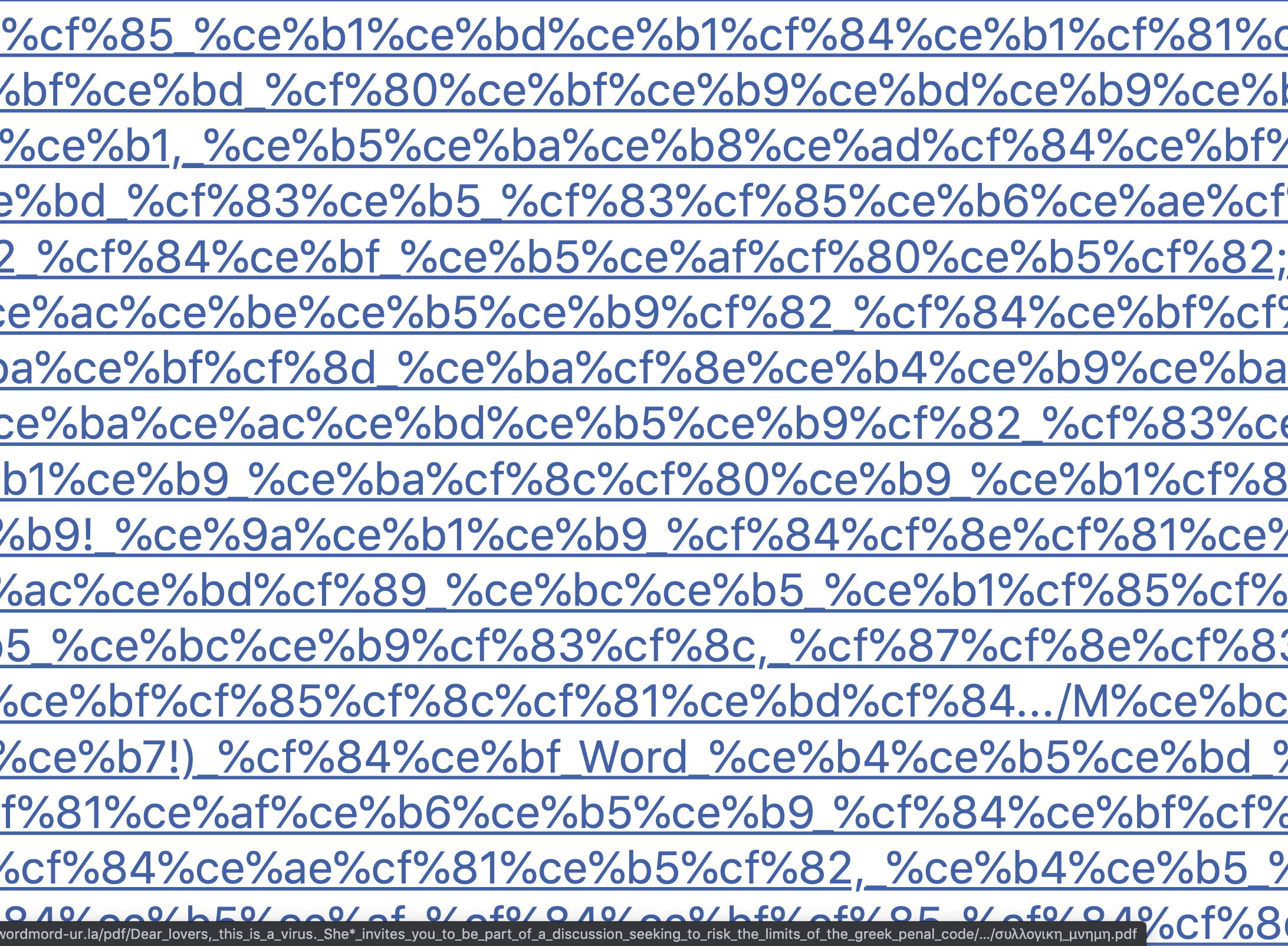
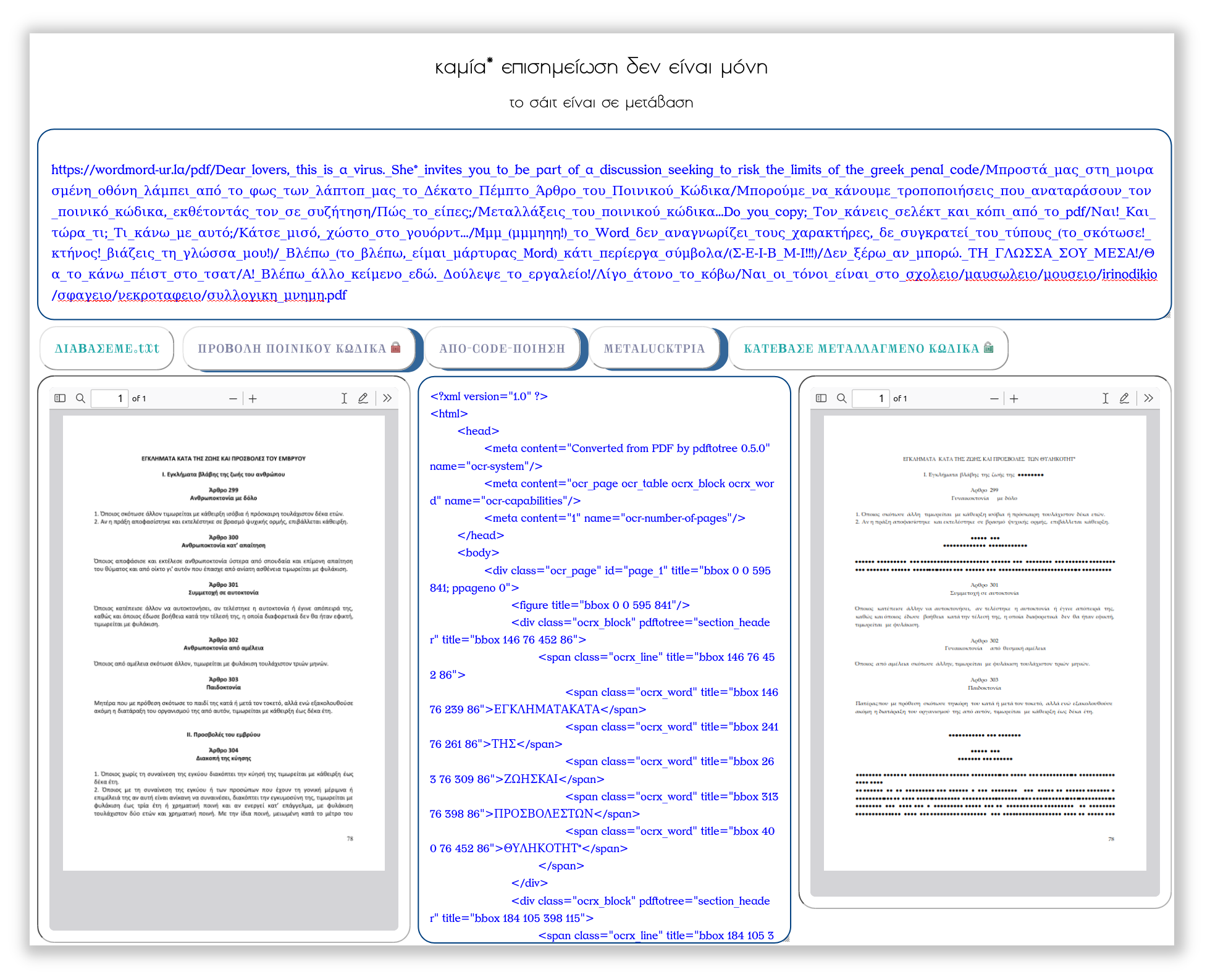
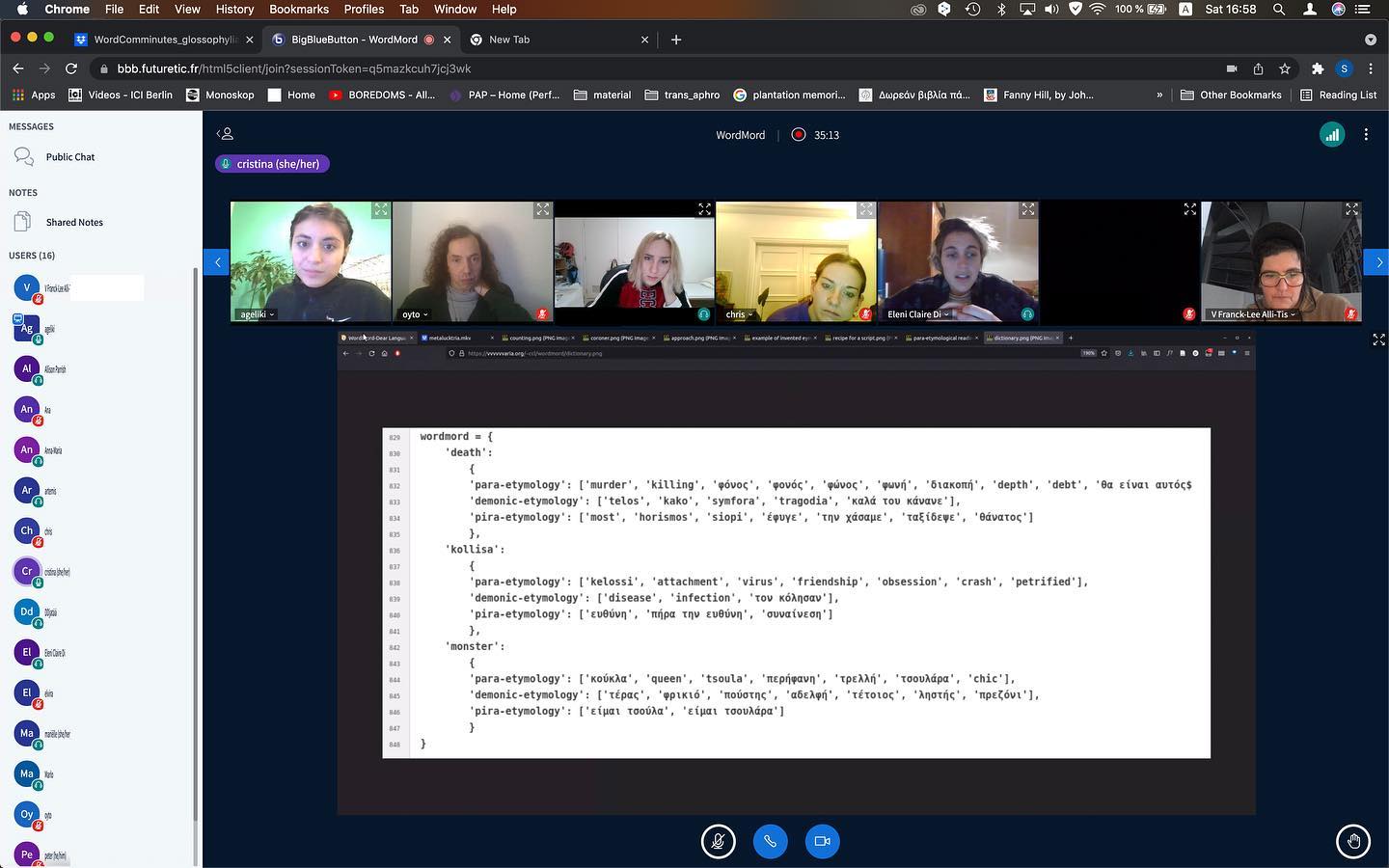
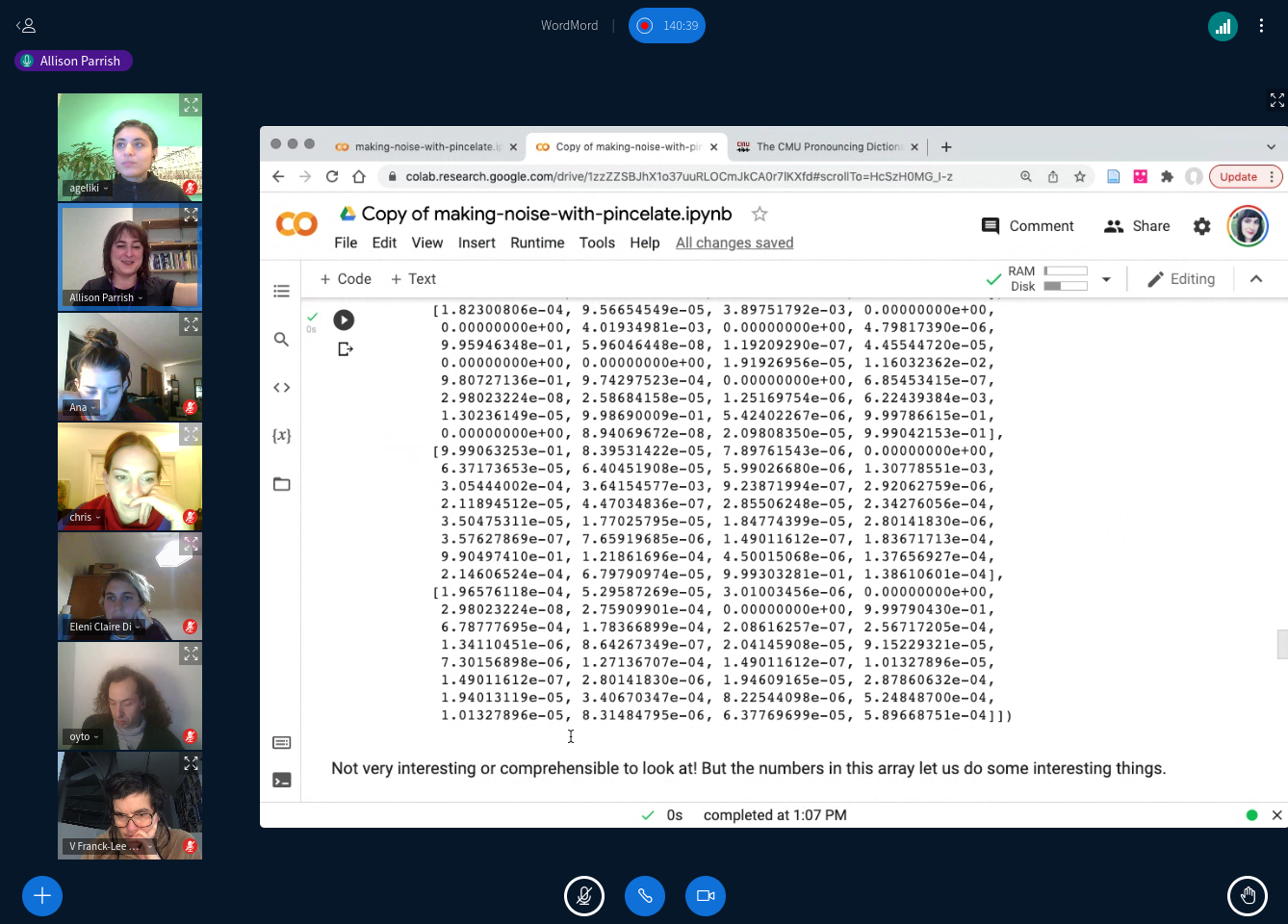

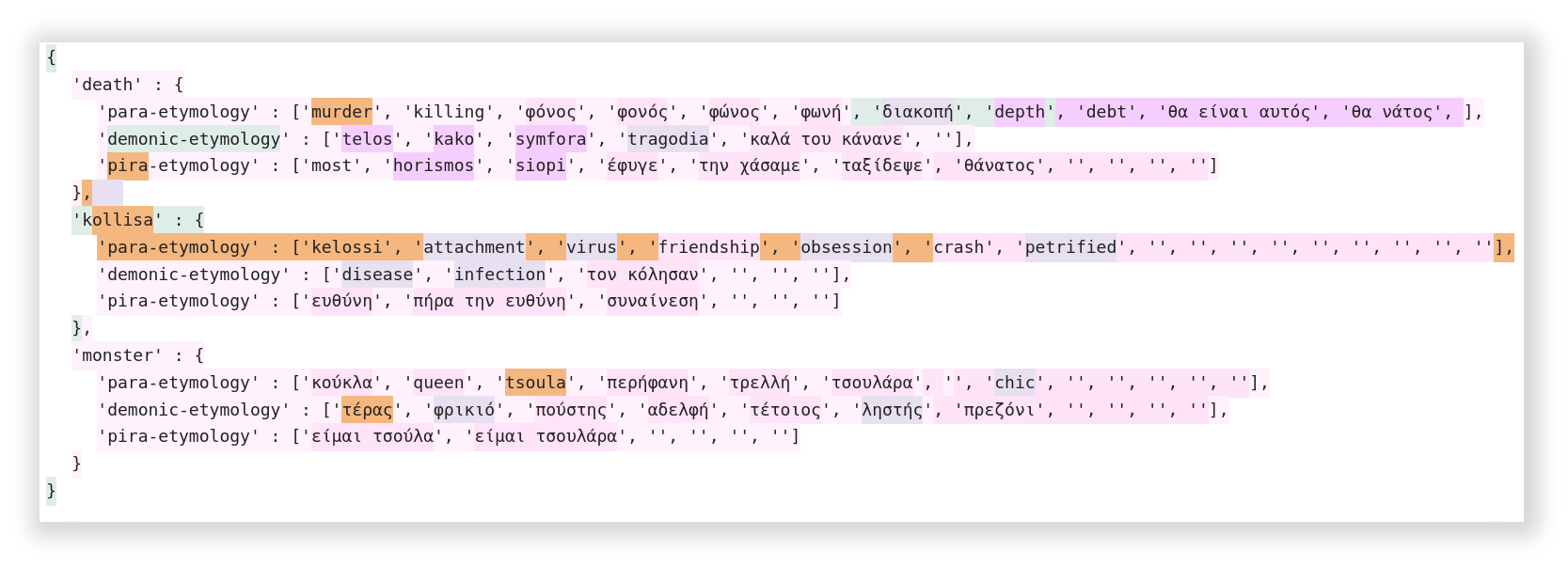
Web-based annotations
The web-based tool that accommodates annotations on the Chapter Fifteen of the Penal Code, which deals with Crimes Against Life is developed with Flask and javascript with the help of Alex Roidl. Its current version is under development.
"Dear [neutral] language, (...)"
In this workshop (10/11/2021) WordMord presented their investigations of how coding can destabilise traumatic language. The group had also invited Allisson Parrish to conduct the workshop 'Creative Writing with Computers, Noise and Mulch'.
Para-dictionary
The para-dictionary is a method to count violent words in journalistic contexts in cases of femicides and the killing of Zak/Zackie Oh. Through an algorithmic and performative counting we see how the language is changing according to the perspective of the writer, often distorting the facts and erasing, ignoring events behind the murders that target the murderers.
Counting as mourning, counting as praying, keeping track, documenting, remembering, counting the beatings, counting the age, counting as ritual, death counts of femicides.
at Parallel Library Services
In this workshop we used tools such as Python3, Tesseract, and ImageMagick to go through the experimental workflow the WordMord team has been using. In preparation, participants were asked to bring formal, bureaucratic or legal PDFs that become obstacles for them or their community. We began by reading together an excerpt from Chapter Four ("The Weather”, pg 113 - pg 120) of Christina Sharpe's "In the Wake: On Blackness and Being", which is about what she calls “Black Annotation" and “Black Redaction", part of the "wake work" of Black survival.
at Art Meet Radical Openness 2022 - Debug
During AMRO22 - Debug WordMord presented an initial version of the tool: by using Python, Tesseract, and ImageMagick we replace the searchable text of the PDF of the penal code with other words. One of the mutations refers to the replacement of the term 'homocide' with 'femicide'. This replacement happens in an hocr file that can be extracted from the PDF and then inserted back into it. As a result it is a hidden annotation that can be visible when copying the text or by making a new PDF.
at A Traversal Network of Feminist Servers (ATNOFS)
WordMord was invited by the Feminist Hack Meetings from Varia to present its methods and tools at ATNOFS in Athens.
A Traversal Network of Feminist Servers (ATNOFS) is a collaborative project formed around intersectional, feminist, ecological servers whose communities travelled between each other in 2022 to share and extend their knowledges through live gatherings. ATNOFS argues that such platforms and tools are necessary to navigate our communications and cultural growth beyond the current media oligopolies, and democratise cultural and political expression outside obscure, bureaucratic algorithms and advertising monetisation.
The project responded to the need for continuity, interrelation and support for self-hosted and self-organised computational infrastructures in The Netherlands (Varia, LURK), Romania (hypha), Austria (esc mkl), Greece (Feminist Hack Meetings) and Belgium (Constant).
A series of workshops took place in the different cities of the hosters and a publication from this process was published at the end.
WordMord
WordMord is a collective artistic research which started as part of the seminar Feminist Practices in the Public Space at the Era of Globalised Technologies, organized by the Centre of New Media and Feminist Practices in the Public Space at the Department of Architecture, University of Volos (GR) in 2019. The project´s starting point are two instances of public violence, misogyny, and homophobia that occurred in Greece in 2018: the brutal murder of the queer activist Zak/Zackie Oh in Athens and the femicide of Eleni Topaludi in Rhodes.
WordMord means that words can kill. WordMord poses questions on the relationship between language, technology, trauma and violence. How is violence represented through (online) narratives? How can we assemble, archive and thus deconstruct heteronormative, derogatory, sexist, homophobic and transphobic narratives? WordMord believes that the violence of language is not eradicated by merely erasing words, but rather by transversing their violent imposition through specific practices, that trouble and disrupt grammatical consistency, semantic norms, 'correct' pronunciation. The rupture of linguistic limits suggests the possibility of experiencing language in its materiality.